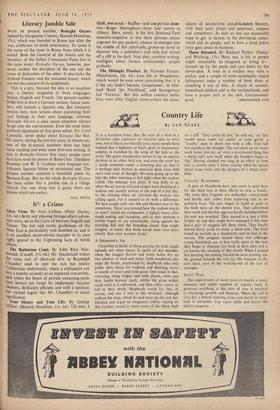Country Life
By IAN NIALL Ir is a harmless fancy that the note of a bird at a particular time expresses an emotion akin to one's own, but if this is not literally true, many people have noticed that a lightness of heart, grief or momentary sadness, is matched by the song of the lark or the wren. The green woodpecker seems to me to express derision as no other bird can, and even the crow has a harsh comment under a lowering sky, so that it is perhaps only human to associate these cries with one's own train of thought. We were going up to the lake the other morning at first light when the cuckoo called. The message was plain. It was folly to go when the air was so still and midges were dancing in a fashion one usually notices at the end of a hot day. In the evening when we returned the cuckoo was calling again, but it seemed to be with a difference. We had caught only one fish and thunder was in the mountains. 'Have you noticed how the cuckoo mocks us now?' asked my companion. I sighed, weary after much casting and tramping, and at that moment a curlew began to cry mournfully, rising against the scowling hill and the brooding cloud. One might imagine, at times, that birds watch man even more ,closely than man watches birds!


































 Previous page
Previous page